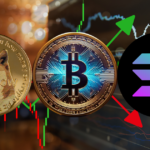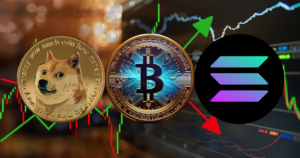Supreme Court Decisions and Bitcoin – Implications for Regulatory Overreach

Yesterday, the Supreme Court of the United States issued two important cases which will likely have wide ranging impacts for Bitcoin and crypto. The decisions are National Rifle Association of America v. Vullo (NRA) and Cantero, et al. v. Bank of America, N. A. (Cantero).
In NRA, the Court addressed a critical issue impacting not only traditional advocacy groups but any disfavored, but legal, industry. This ruling draws parallels to Operation Choke Point 2.0, where U.S. regulators have allegedly been targeting crypto businesses through financial exclusion. Moreover, the recent Cantero decision sheds light on how this legal framework might impact Custodia Bank’s appeal against the denial of their master account by the Federal Reserve.
Also Read – Which Crypto Audit & KYC Provider Reigns Supreme on Arbitrum?
THE NRA CASE
The National Rifle Association (the NRA) sued Maria Vullo, former superintendent of the New York Department of Financial Services (DFS), alleging that she used her regulatory authority to coerce financial institutions into severing ties with the NRA. The NRA claimed this was an unconstitutional suppression of their First Amendment rights.
Vullo argued that her actions targeted business practices and relationships, which she claimed were “non expressive activity” rather than speech, and as such wasn’t unconstitutional coercion on bitcoin. However, the Supreme Court found this argument misplaced. “That Vullo ‘regulate[d]’ business activities stemming from the NRA’s ‘relationships with insurers and banks,’ does not change the allegations that her actions were aimed at punishing or suppressing speech.” See NRA decision, page 17 (internal citations omitted, emphasis added).
The Supreme Court vacated the Second Circuit’s decision favoring Vullo and remanded the case, reiterating, again, that government officials cannot use coercion to punish or suppress disfavored speech or advocacy indirectly.
OPERATION CHOKE POINT
Operation Choke Point was an initiative by the Department of Justice ( D.O.J ) aimed at “Choking Out” businesses considered high-risk by denying them access to banking and payment networks. Although these businesses, such as firearms dealers, payday lenders, and adult entertainment, were legal, the DOJ pressured banks to terminate relationships with them, citing “reputational risk.” This initiative effectively coerced banks into compliance under the threat of federal investigation, significantly impacting legitimate businesses across various industries. The FDIC finally settled a lawsuit related to Operation Choke Point in 2019.
Operation Choke Point 2.0, a term coined to describe the alleged actions of U.S. regulators against the cryptocurrency industry, involves a series of informal guidance and regulatory pressures aimed at financial institutions to limit or terminate their relationships with crypto businesses. This echoes the original, and illegal, Operation Choke Point, which targeted industries like payday lending and firearms sales, without due process or clear legal justification.
Just as in NRA, Operation Choke Point 2.0 involves regulatory authorities overstepping their bounds and using undue influence and outright coercion against disfavored, but legal, actors. NRA emphasizes that such overreach, especially when used to suppress specific viewpoints or industries, is unconstitutional. In both scenarios, regulators are accused of using their power to enforce an ideological stance rather than following explicit statutory mandates.
The core of the NRA’s argument was that Vullo’s actions were a violation of their First Amendment rights. Similarly, if regulators are targeting crypto businesses because of a disfavored viewpoint on decentralization and financial autonomy, this could constitute a similar violation. The Supreme Court’s decision reinforces that indirect suppression of speech through coercion is unconstitutional.
NRA also highlights significant due process issues, where affected entities are denied a fair chance to defend themselves against covert regulatory actions. Crypto businesses facing sudden account closures and banking restrictions without clear explanations or recourse echo the NRA’s experience, raising serious due process concerns.
Finally, and this is a bit of speculation, now that the Supreme Court has stated it clearly, one can argue that Qualified Immunity should not be extended to government officials that knowingly violate the Constitution when they coerce or attempt to coerce the violation of First Amendment rights. Removing Qualified Immunity means that such officials can then be held personally liable for violating the Constitution.
Also Read – Smart Contract Audit: Conducting a Thorough Review with Industry-leading Tools
THE CANTERO DECISION AND ITS IMPLICATIONS FOR CUSTODIA BANK FOR BITCOIN
The Cantero case involved Bank of America, a national bank, and whether it was required to pay interest on escrow accounts as mandated by New York state law. The Second Circuit court dismissed the case based on an argument that the New York law was preempted by Federal laws, but did not engage in the required full analysis of this issue. The Supreme Court unanimously ruled that, while state laws significantly interfering with national bank powers are preempted, Congress provided a detailed process, outlined in the Dodd-Frank Act to determine if preemption is appropriate. The Court reversed the Second Circuit, requiring the Circuit court to fully engage in a thorough review of the issues.
As part of this ruling, the Court reiterated that:
The United States maintains a dual system of banking, made up of parallel federal and state banking systems. That dual system allows privately owned banks to choose whether to obtain a charter from the Federal Government or from a state government.
Banks with federal charters, called national banks, are subject primarily to federal oversight and regulation. And banks with state charters, called state banks, are subject to additional state oversight and regulation. Those two banking systems co-exist and compete.
Cantero emphasizes that a finding of significant interference by state laws with national banking powers requires a nuanced analysis aligned with the Dodd-Frank Act and prior Supreme Court precedents, and at a high level both explicitly and implicitly emphasizes that the dual-banking system is still alive and well.
However, if the Federal Reserve can exercise more than ministerial discretion in denying master accounts to state chartered banks, the entire existence of the dual banking system can itself be rendered a nullity. Going further, if the regional Federal Reserve banks do indeed have arbitrary discretion to grant or deny master accounts (as was held by Judge Skavdhal in Custodia’s district court decision), and, as is maintained by the Kansas City Fed that regional Reserve Banks are private, then the same undue influence and coercion arguments of NRA may also be brought to bear here.
CONCLUSION
The Supreme Court’s decisions in NRA and Cantero both provide steps toward addressing Federal overreach related to Bitcoin, impacting both Operation Choke Point 2.0 and Custodia Bank’s access to the financial system. While NRA is more immediately useful, and I believe will be used in short order to attack aspects of Operation Choke Point 2.0, and de-banking of legal but disfavored industries and individuals, Cantero seems to suggest that Custodia is on solid ground in its appeal. But on a more general level, it further exposes the unrestrained nature of the modern administrative state that we also saw deployed against Bitcoin mining in the EIA case.
Small victories, yes. But like stacking sats, they build.
This is a guest post by Colin Crossman. Opinions expressed are entirely their own and do not necessarily reflect those of BTC Inc or Bitcoin Magazine.









 Bitcoin
Bitcoin  Ethereum
Ethereum  Tether
Tether  Solana
Solana  Lido Staked Ether
Lido Staked Ether  USDC
USDC  XRP
XRP  Toncoin
Toncoin  Dogecoin
Dogecoin  Cardano
Cardano  TRON
TRON  Shiba Inu
Shiba Inu  Avalanche
Avalanche  Wrapped Bitcoin
Wrapped Bitcoin  Chainlink
Chainlink  Polkadot
Polkadot  Bitcoin Cash
Bitcoin Cash  Uniswap
Uniswap  NEAR Protocol
NEAR Protocol  Wrapped eETH
Wrapped eETH  Litecoin
Litecoin  Polygon
Polygon  Dai
Dai  LEO Token
LEO Token  Pepe
Pepe  Internet Computer
Internet Computer  Fetch.ai
Fetch.ai  Ethena USDe
Ethena USDe  Renzo Restaked ETH
Renzo Restaked ETH  Ethereum Classic
Ethereum Classic  Aptos
Aptos  Monero
Monero  Hedera
Hedera  Render
Render  Stellar
Stellar  Cosmos Hub
Cosmos Hub  Mantle
Mantle  Arbitrum
Arbitrum  OKB
OKB  Cronos
Cronos  Filecoin
Filecoin  Stacks
Stacks  First Digital USD
First Digital USD  Immutable
Immutable  Sui
Sui  Maker
Maker  Injective
Injective